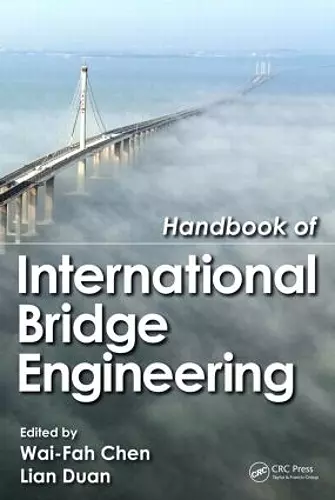Handbook of International Bridge Engineering
A Global Perspective on Bridge Engineering Practices
Wai-Fah Chen editor Lian Duan editor
Format:Hardback
Publisher:Taylor & Francis Inc
Published:11th Oct '13
Currently unavailable, our supplier has not provided us a restock date

This resource offers a thorough overview of bridge engineering practices worldwide, including materials and designs. The Handbook of International Bridge Engineering is essential for professionals and students alike.
The Handbook of International Bridge Engineering serves as a comprehensive reference for bridge engineering practices across the globe. It encompasses a wide range of regions, including North America, South America, Europe, Asia, and the Middle East, providing insights into the latest developments and standards in the field. This resource is particularly valuable for engineers, architects, and students, as it details the state-of-the-art techniques and materials utilized in bridge construction and design.
In addition to exploring various materials such as stone, timber, concrete, and steel, the Handbook of International Bridge Engineering delves into the different types of bridges, including slab, girder, segmental, truss, arch, suspension, and cable-stayed structures. The book features a color insert showcasing landmark bridges from around the world, enhancing the reader's understanding of design aesthetics and engineering feats. Furthermore, it presents benchmark comparisons for highway composite girder design across different countries, highlighting innovative practices and standards.
The book also provides extensive data on the highest and longest bridges globally, categorizing them by type and construction methods. This thorough examination of bridge engineering not only serves as a practical guide for professionals but also as an educational tool for those looking to understand the complexities of bridge design and construction in various cultural and geographical contexts.
"This is a monumental work that brings to the bridge engineering profession of the world a comprehensive vision of both the history and the current status of the whole field. I do not recall having seen anything like this before. I was asked to review the chapter on the bridges in Japan. That country has many monumental bridges, including the world’s longest bridge. The descriptions in the chapter are very instructive. They describe not only all the bridge types and the construction materials, but they also give details on the legal, and societal aspects of Japanese bridges. Triumphs and failures are discussed. The difficult issue of designing against seimic hazards is well documented. … If what I have seen in the chapter on Japanese bridges is true for all the chapters, then this will be a landmark book for bridge engineers and engineering students and practitioners for many years to come. Knowing the editors, I have no doubt that this will be the case. The book will not only be useful as a fount of knowledge, but it will also be very valuable in the increasingly globalized practice of engineering construction."
––Theodore V. Galambos, University of Minnesota, Minneapolis, MN
"At first sight this might appear to be yet another ' Coffee Table Book ' I.e. something to be displayed in Reception for those waiting to be seen to browse as an alternative to checking their emails. It is, however, much more than this. It is a work of real technical merit, of considerable practical significance and of substantial interest. Those who come across a copy by accident will note its potential usefulness and inherent interest and will, as a result, seek to acquire a copy themselves. How does it achieve this? By making the wonder, the history and the technology of bridges available through the sometimes discounted but still highly effective means of the printed page. Readers may, therefore choose to focus on a particular country, a certain bridge type, to use as a reference work , to consult in the expectation that at least something relevant will be found and that the text and references will lead on to more detailed material or, simply, as 'technical relaxation' whilst travelling. … The authors have assembled an obviously highly talented team of writers and have drawn from them a work of real substance. It deserves a place on the shelves - and the coffee tables - of bridge engineers and those with an interest in the technology of bridges worldwide."
––Professor D A Nethercot , FTSE Emeritus Professor of Civil Engineering Imperial College London, UK
"Part of the book might be sustainability 101 for many. The ethical dilemmas in this book is a must read for big and small consultancy firms as well as for buisness and for NGO’s and in a condensed version boards of directors. Some of the examples might be a little "thought up" but it is really important to discusss from the consultant team to the boardroom – ideally through a faciilated discussion between the different parties. … We live in a world where we do not share the same purpose and not all share the same ethics on how to reach the defined purpose of an organization. … This book is an important contribution to facilitate a discussion on the dilemmas consultants need to navigate with integrity."
––Helle Bank Jorgenson, CEO, B. Accountability and United Nations Special Advisor to Global Compact in Canada
ISBN: 9781439810293
Dimensions: unknown
Weight: 2540g
1394 pages